HI6028 Taxation Law: RIP Pty Ltd. Case Study
VerifiedAdded on 2024/06/03
|9
|1943
|195
AI Summary
This case study examines the tax implications of RIP Pty Ltd., a company providing funeral services. It analyzes the taxability of income received in advance, deduction of business expenses, and adjustments to the company's profits. The case study draws upon the landmark case of Arthur Murray v FCT to determine the appropriate accounting treatment for advance payments and the taxability of forfeited amounts. It also explores the deductibility of various expenses, including trading stock, dividends, prepaid rent, long service leave provisions, and capital expenditures.
Contribute Materials
Your contribution can guide someone’s learning journey. Share your
documents today.
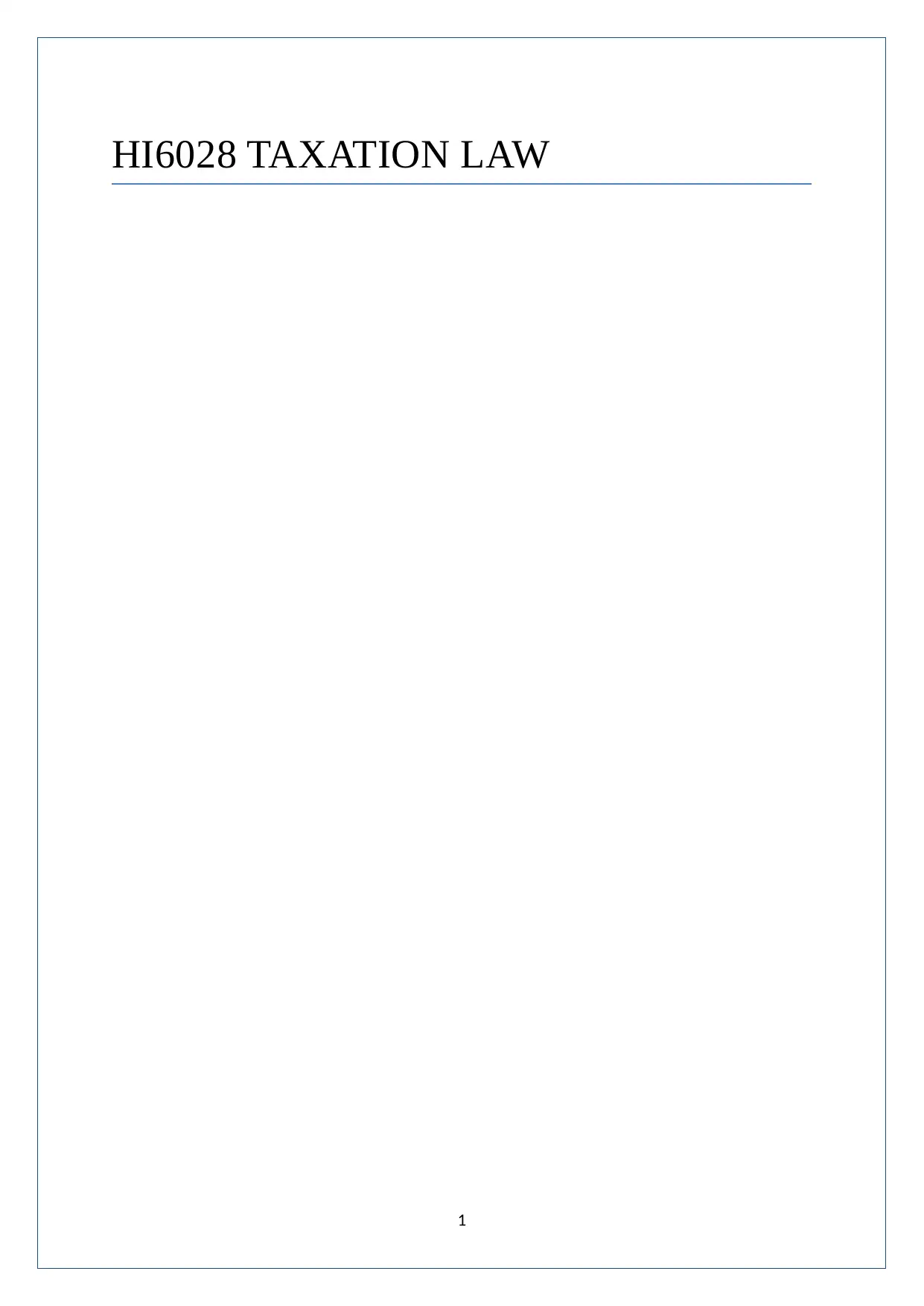
HI6028 TAXATION LAW
1
1
Secure Best Marks with AI Grader
Need help grading? Try our AI Grader for instant feedback on your assignments.
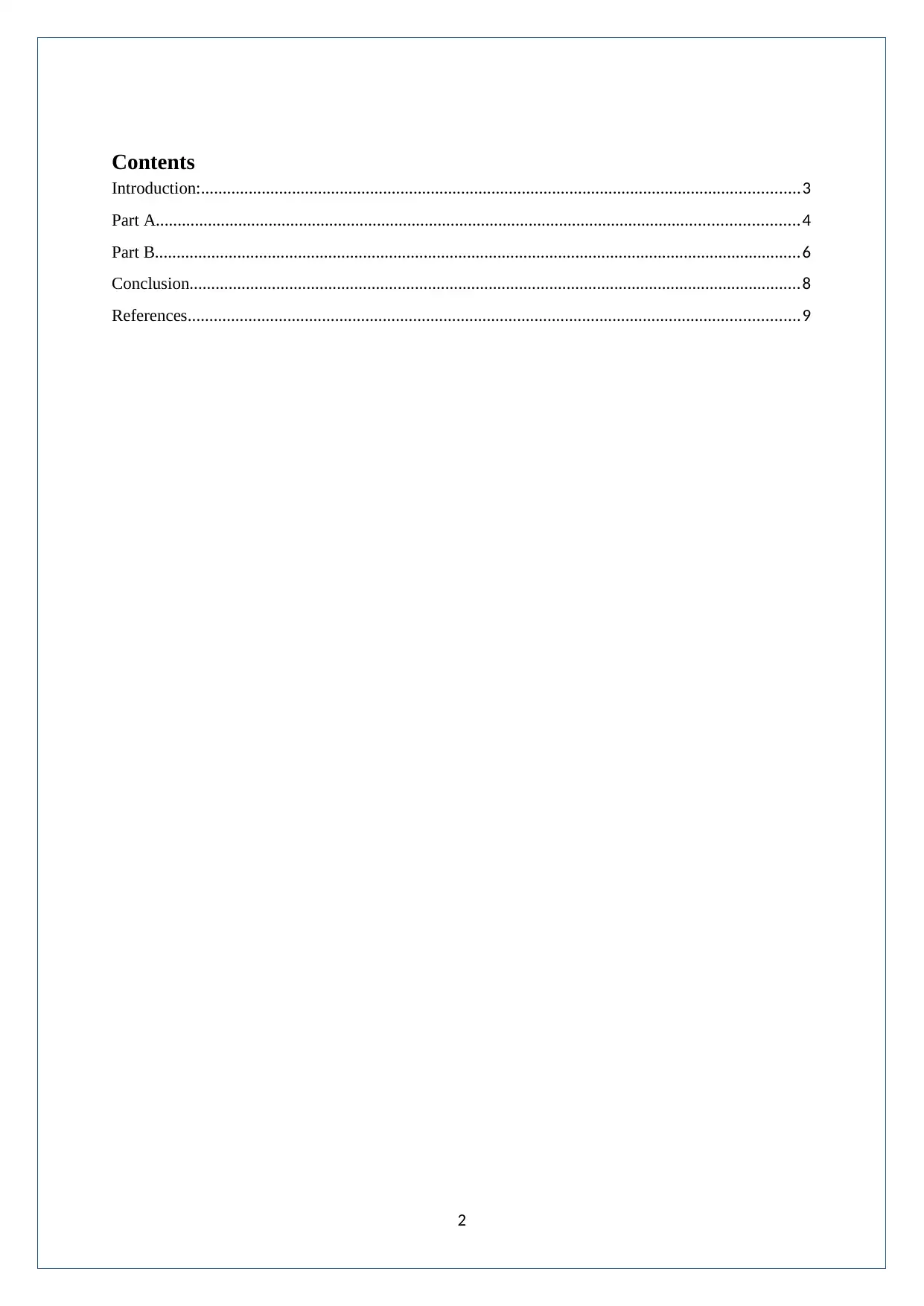
Contents
Introduction:..........................................................................................................................................3
Part A....................................................................................................................................................4
Part B.....................................................................................................................................................6
Conclusion.............................................................................................................................................8
References.............................................................................................................................................9
2
Introduction:..........................................................................................................................................3
Part A....................................................................................................................................................4
Part B.....................................................................................................................................................6
Conclusion.............................................................................................................................................8
References.............................................................................................................................................9
2
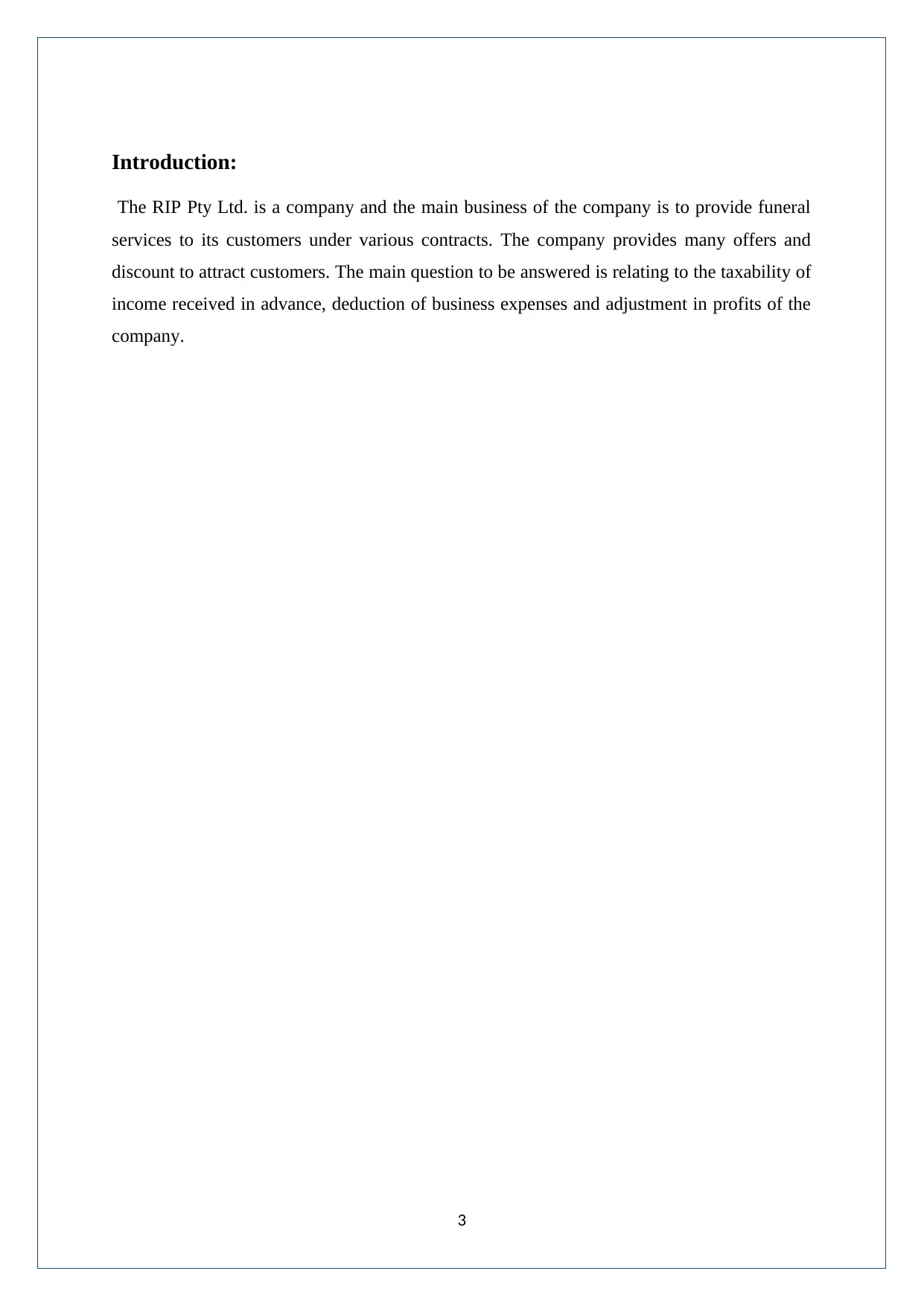
Introduction:
The RIP Pty Ltd. is a company and the main business of the company is to provide funeral
services to its customers under various contracts. The company provides many offers and
discount to attract customers. The main question to be answered is relating to the taxability of
income received in advance, deduction of business expenses and adjustment in profits of the
company.
3
The RIP Pty Ltd. is a company and the main business of the company is to provide funeral
services to its customers under various contracts. The company provides many offers and
discount to attract customers. The main question to be answered is relating to the taxability of
income received in advance, deduction of business expenses and adjustment in profits of the
company.
3
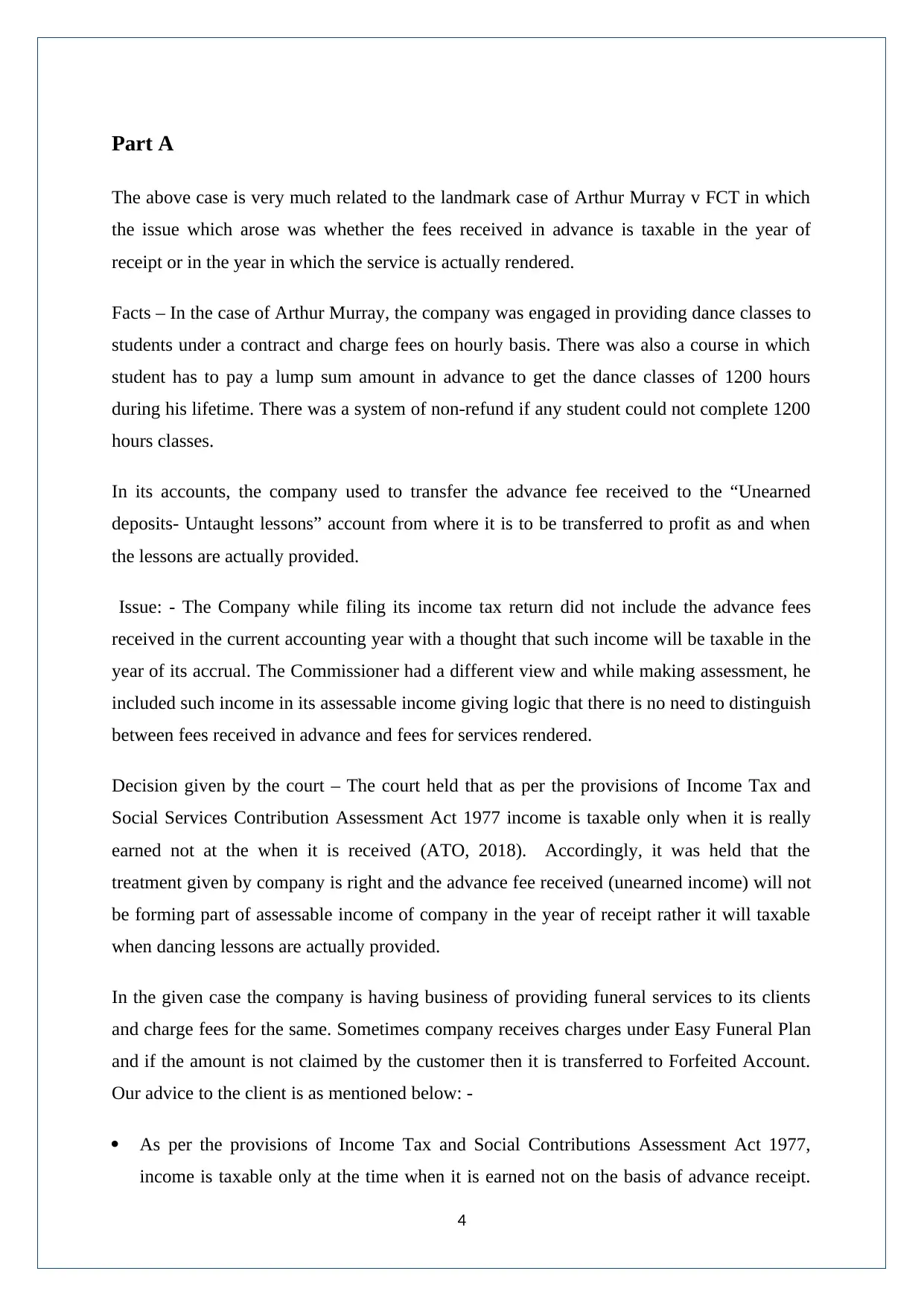
Part A
The above case is very much related to the landmark case of Arthur Murray v FCT in which
the issue which arose was whether the fees received in advance is taxable in the year of
receipt or in the year in which the service is actually rendered.
Facts – In the case of Arthur Murray, the company was engaged in providing dance classes to
students under a contract and charge fees on hourly basis. There was also a course in which
student has to pay a lump sum amount in advance to get the dance classes of 1200 hours
during his lifetime. There was a system of non-refund if any student could not complete 1200
hours classes.
In its accounts, the company used to transfer the advance fee received to the “Unearned
deposits- Untaught lessons” account from where it is to be transferred to profit as and when
the lessons are actually provided.
Issue: - The Company while filing its income tax return did not include the advance fees
received in the current accounting year with a thought that such income will be taxable in the
year of its accrual. The Commissioner had a different view and while making assessment, he
included such income in its assessable income giving logic that there is no need to distinguish
between fees received in advance and fees for services rendered.
Decision given by the court – The court held that as per the provisions of Income Tax and
Social Services Contribution Assessment Act 1977 income is taxable only when it is really
earned not at the when it is received (ATO, 2018). Accordingly, it was held that the
treatment given by company is right and the advance fee received (unearned income) will not
be forming part of assessable income of company in the year of receipt rather it will taxable
when dancing lessons are actually provided.
In the given case the company is having business of providing funeral services to its clients
and charge fees for the same. Sometimes company receives charges under Easy Funeral Plan
and if the amount is not claimed by the customer then it is transferred to Forfeited Account.
Our advice to the client is as mentioned below: -
As per the provisions of Income Tax and Social Contributions Assessment Act 1977,
income is taxable only at the time when it is earned not on the basis of advance receipt.
4
The above case is very much related to the landmark case of Arthur Murray v FCT in which
the issue which arose was whether the fees received in advance is taxable in the year of
receipt or in the year in which the service is actually rendered.
Facts – In the case of Arthur Murray, the company was engaged in providing dance classes to
students under a contract and charge fees on hourly basis. There was also a course in which
student has to pay a lump sum amount in advance to get the dance classes of 1200 hours
during his lifetime. There was a system of non-refund if any student could not complete 1200
hours classes.
In its accounts, the company used to transfer the advance fee received to the “Unearned
deposits- Untaught lessons” account from where it is to be transferred to profit as and when
the lessons are actually provided.
Issue: - The Company while filing its income tax return did not include the advance fees
received in the current accounting year with a thought that such income will be taxable in the
year of its accrual. The Commissioner had a different view and while making assessment, he
included such income in its assessable income giving logic that there is no need to distinguish
between fees received in advance and fees for services rendered.
Decision given by the court – The court held that as per the provisions of Income Tax and
Social Services Contribution Assessment Act 1977 income is taxable only when it is really
earned not at the when it is received (ATO, 2018). Accordingly, it was held that the
treatment given by company is right and the advance fee received (unearned income) will not
be forming part of assessable income of company in the year of receipt rather it will taxable
when dancing lessons are actually provided.
In the given case the company is having business of providing funeral services to its clients
and charge fees for the same. Sometimes company receives charges under Easy Funeral Plan
and if the amount is not claimed by the customer then it is transferred to Forfeited Account.
Our advice to the client is as mentioned below: -
As per the provisions of Income Tax and Social Contributions Assessment Act 1977,
income is taxable only at the time when it is earned not on the basis of advance receipt.
4
Secure Best Marks with AI Grader
Need help grading? Try our AI Grader for instant feedback on your assignments.
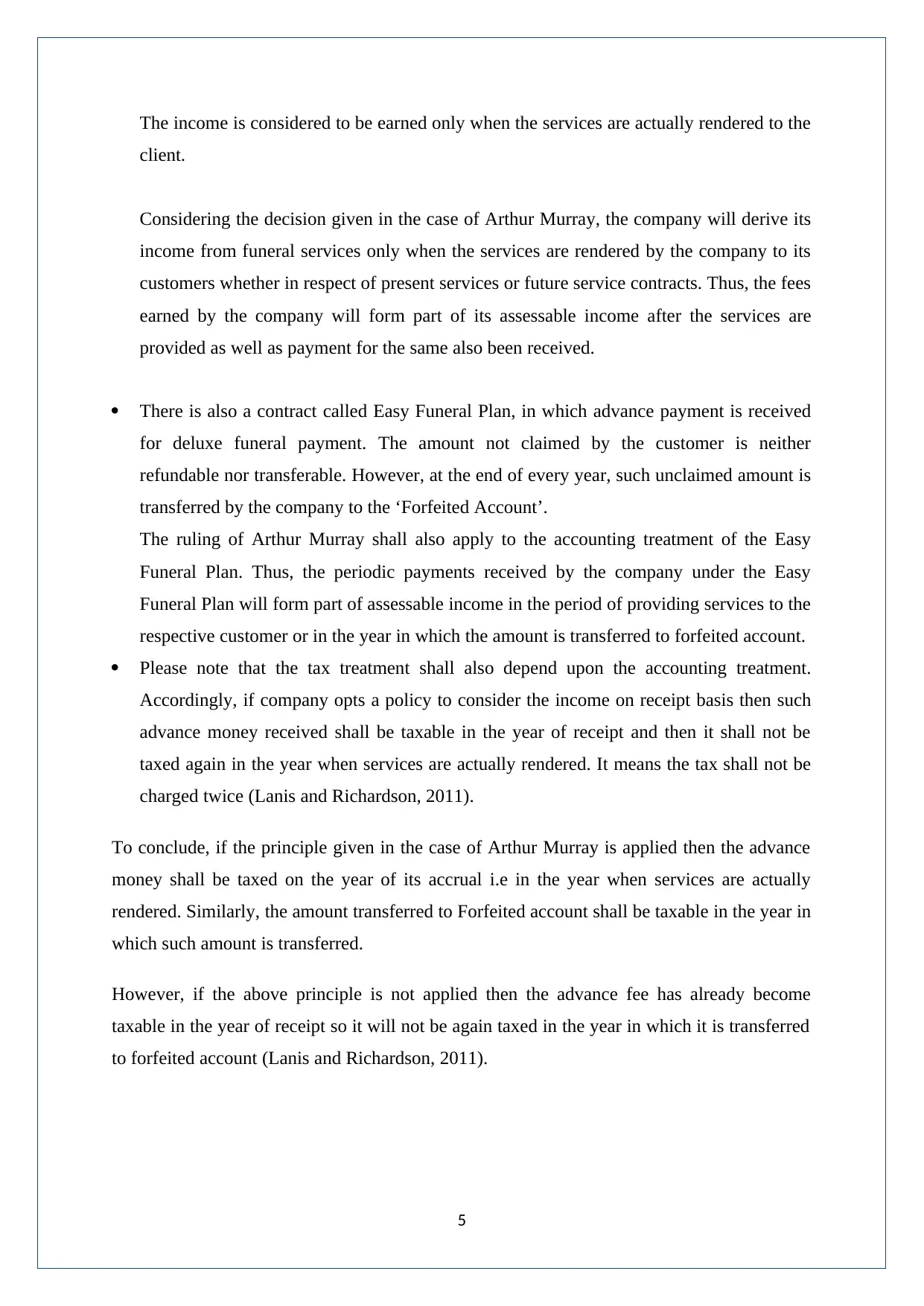
The income is considered to be earned only when the services are actually rendered to the
client.
Considering the decision given in the case of Arthur Murray, the company will derive its
income from funeral services only when the services are rendered by the company to its
customers whether in respect of present services or future service contracts. Thus, the fees
earned by the company will form part of its assessable income after the services are
provided as well as payment for the same also been received.
There is also a contract called Easy Funeral Plan, in which advance payment is received
for deluxe funeral payment. The amount not claimed by the customer is neither
refundable nor transferable. However, at the end of every year, such unclaimed amount is
transferred by the company to the ‘Forfeited Account’.
The ruling of Arthur Murray shall also apply to the accounting treatment of the Easy
Funeral Plan. Thus, the periodic payments received by the company under the Easy
Funeral Plan will form part of assessable income in the period of providing services to the
respective customer or in the year in which the amount is transferred to forfeited account.
Please note that the tax treatment shall also depend upon the accounting treatment.
Accordingly, if company opts a policy to consider the income on receipt basis then such
advance money received shall be taxable in the year of receipt and then it shall not be
taxed again in the year when services are actually rendered. It means the tax shall not be
charged twice (Lanis and Richardson, 2011).
To conclude, if the principle given in the case of Arthur Murray is applied then the advance
money shall be taxed on the year of its accrual i.e in the year when services are actually
rendered. Similarly, the amount transferred to Forfeited account shall be taxable in the year in
which such amount is transferred.
However, if the above principle is not applied then the advance fee has already become
taxable in the year of receipt so it will not be again taxed in the year in which it is transferred
to forfeited account (Lanis and Richardson, 2011).
5
client.
Considering the decision given in the case of Arthur Murray, the company will derive its
income from funeral services only when the services are rendered by the company to its
customers whether in respect of present services or future service contracts. Thus, the fees
earned by the company will form part of its assessable income after the services are
provided as well as payment for the same also been received.
There is also a contract called Easy Funeral Plan, in which advance payment is received
for deluxe funeral payment. The amount not claimed by the customer is neither
refundable nor transferable. However, at the end of every year, such unclaimed amount is
transferred by the company to the ‘Forfeited Account’.
The ruling of Arthur Murray shall also apply to the accounting treatment of the Easy
Funeral Plan. Thus, the periodic payments received by the company under the Easy
Funeral Plan will form part of assessable income in the period of providing services to the
respective customer or in the year in which the amount is transferred to forfeited account.
Please note that the tax treatment shall also depend upon the accounting treatment.
Accordingly, if company opts a policy to consider the income on receipt basis then such
advance money received shall be taxable in the year of receipt and then it shall not be
taxed again in the year when services are actually rendered. It means the tax shall not be
charged twice (Lanis and Richardson, 2011).
To conclude, if the principle given in the case of Arthur Murray is applied then the advance
money shall be taxed on the year of its accrual i.e in the year when services are actually
rendered. Similarly, the amount transferred to Forfeited account shall be taxable in the year in
which such amount is transferred.
However, if the above principle is not applied then the advance fee has already become
taxable in the year of receipt so it will not be again taxed in the year in which it is transferred
to forfeited account (Lanis and Richardson, 2011).
5
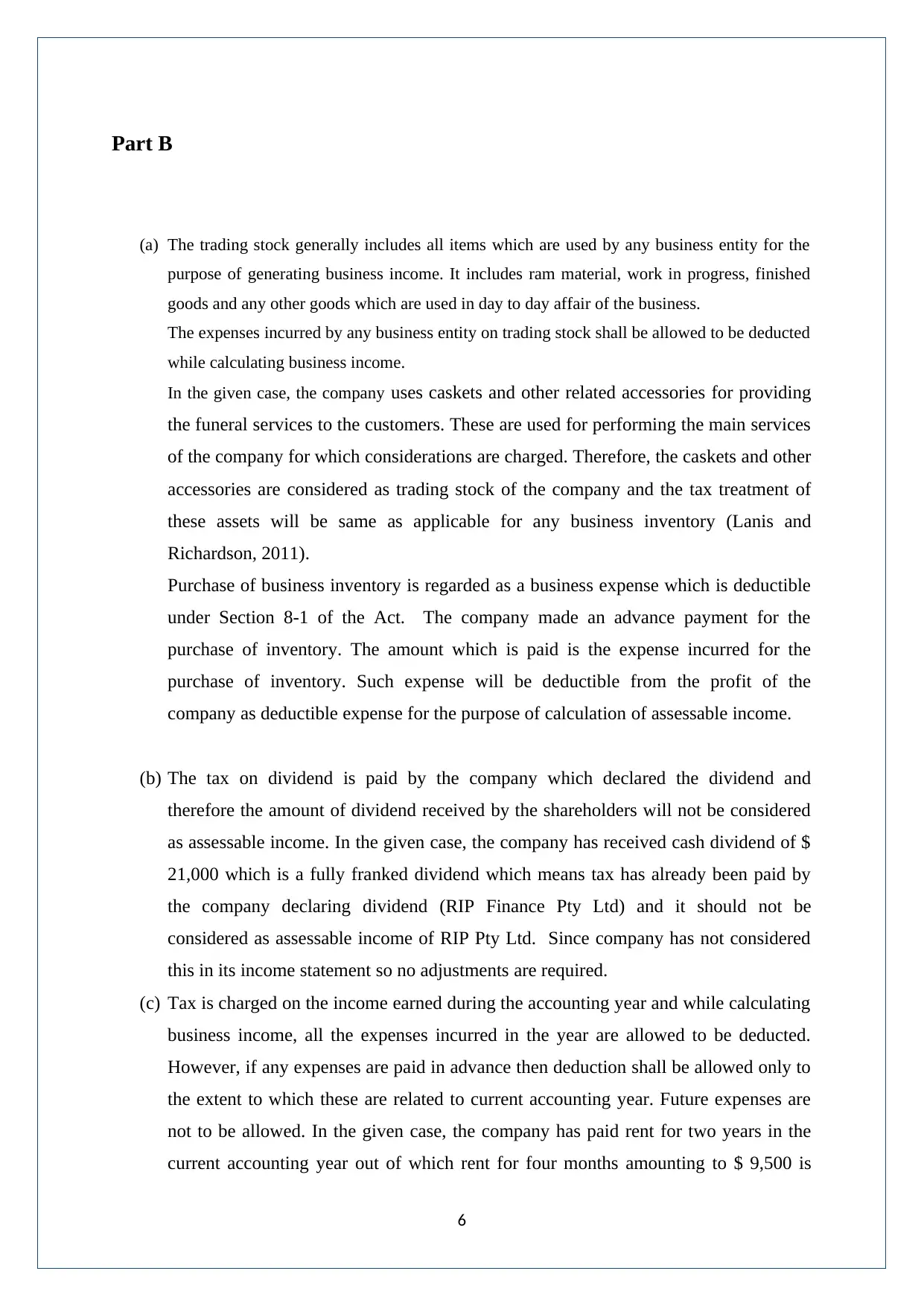
Part B
(a) The trading stock generally includes all items which are used by any business entity for the
purpose of generating business income. It includes ram material, work in progress, finished
goods and any other goods which are used in day to day affair of the business.
The expenses incurred by any business entity on trading stock shall be allowed to be deducted
while calculating business income.
In the given case, the company uses caskets and other related accessories for providing
the funeral services to the customers. These are used for performing the main services
of the company for which considerations are charged. Therefore, the caskets and other
accessories are considered as trading stock of the company and the tax treatment of
these assets will be same as applicable for any business inventory (Lanis and
Richardson, 2011).
Purchase of business inventory is regarded as a business expense which is deductible
under Section 8-1 of the Act. The company made an advance payment for the
purchase of inventory. The amount which is paid is the expense incurred for the
purchase of inventory. Such expense will be deductible from the profit of the
company as deductible expense for the purpose of calculation of assessable income.
(b) The tax on dividend is paid by the company which declared the dividend and
therefore the amount of dividend received by the shareholders will not be considered
as assessable income. In the given case, the company has received cash dividend of $
21,000 which is a fully franked dividend which means tax has already been paid by
the company declaring dividend (RIP Finance Pty Ltd) and it should not be
considered as assessable income of RIP Pty Ltd. Since company has not considered
this in its income statement so no adjustments are required.
(c) Tax is charged on the income earned during the accounting year and while calculating
business income, all the expenses incurred in the year are allowed to be deducted.
However, if any expenses are paid in advance then deduction shall be allowed only to
the extent to which these are related to current accounting year. Future expenses are
not to be allowed. In the given case, the company has paid rent for two years in the
current accounting year out of which rent for four months amounting to $ 9,500 is
6
(a) The trading stock generally includes all items which are used by any business entity for the
purpose of generating business income. It includes ram material, work in progress, finished
goods and any other goods which are used in day to day affair of the business.
The expenses incurred by any business entity on trading stock shall be allowed to be deducted
while calculating business income.
In the given case, the company uses caskets and other related accessories for providing
the funeral services to the customers. These are used for performing the main services
of the company for which considerations are charged. Therefore, the caskets and other
accessories are considered as trading stock of the company and the tax treatment of
these assets will be same as applicable for any business inventory (Lanis and
Richardson, 2011).
Purchase of business inventory is regarded as a business expense which is deductible
under Section 8-1 of the Act. The company made an advance payment for the
purchase of inventory. The amount which is paid is the expense incurred for the
purchase of inventory. Such expense will be deductible from the profit of the
company as deductible expense for the purpose of calculation of assessable income.
(b) The tax on dividend is paid by the company which declared the dividend and
therefore the amount of dividend received by the shareholders will not be considered
as assessable income. In the given case, the company has received cash dividend of $
21,000 which is a fully franked dividend which means tax has already been paid by
the company declaring dividend (RIP Finance Pty Ltd) and it should not be
considered as assessable income of RIP Pty Ltd. Since company has not considered
this in its income statement so no adjustments are required.
(c) Tax is charged on the income earned during the accounting year and while calculating
business income, all the expenses incurred in the year are allowed to be deducted.
However, if any expenses are paid in advance then deduction shall be allowed only to
the extent to which these are related to current accounting year. Future expenses are
not to be allowed. In the given case, the company has paid rent for two years in the
current accounting year out of which rent for four months amounting to $ 9,500 is
6
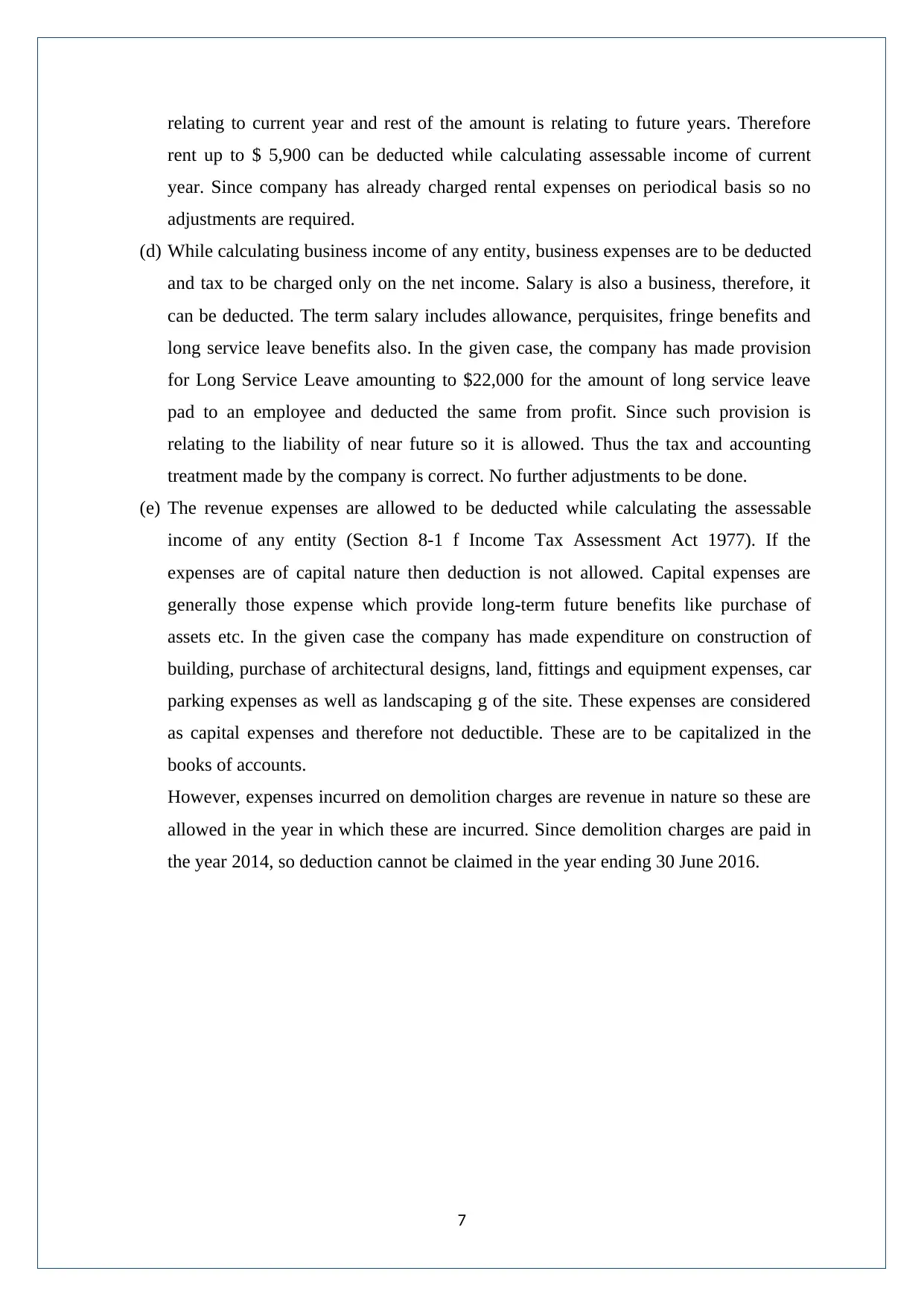
relating to current year and rest of the amount is relating to future years. Therefore
rent up to $ 5,900 can be deducted while calculating assessable income of current
year. Since company has already charged rental expenses on periodical basis so no
adjustments are required.
(d) While calculating business income of any entity, business expenses are to be deducted
and tax to be charged only on the net income. Salary is also a business, therefore, it
can be deducted. The term salary includes allowance, perquisites, fringe benefits and
long service leave benefits also. In the given case, the company has made provision
for Long Service Leave amounting to $22,000 for the amount of long service leave
pad to an employee and deducted the same from profit. Since such provision is
relating to the liability of near future so it is allowed. Thus the tax and accounting
treatment made by the company is correct. No further adjustments to be done.
(e) The revenue expenses are allowed to be deducted while calculating the assessable
income of any entity (Section 8-1 f Income Tax Assessment Act 1977). If the
expenses are of capital nature then deduction is not allowed. Capital expenses are
generally those expense which provide long-term future benefits like purchase of
assets etc. In the given case the company has made expenditure on construction of
building, purchase of architectural designs, land, fittings and equipment expenses, car
parking expenses as well as landscaping g of the site. These expenses are considered
as capital expenses and therefore not deductible. These are to be capitalized in the
books of accounts.
However, expenses incurred on demolition charges are revenue in nature so these are
allowed in the year in which these are incurred. Since demolition charges are paid in
the year 2014, so deduction cannot be claimed in the year ending 30 June 2016.
7
rent up to $ 5,900 can be deducted while calculating assessable income of current
year. Since company has already charged rental expenses on periodical basis so no
adjustments are required.
(d) While calculating business income of any entity, business expenses are to be deducted
and tax to be charged only on the net income. Salary is also a business, therefore, it
can be deducted. The term salary includes allowance, perquisites, fringe benefits and
long service leave benefits also. In the given case, the company has made provision
for Long Service Leave amounting to $22,000 for the amount of long service leave
pad to an employee and deducted the same from profit. Since such provision is
relating to the liability of near future so it is allowed. Thus the tax and accounting
treatment made by the company is correct. No further adjustments to be done.
(e) The revenue expenses are allowed to be deducted while calculating the assessable
income of any entity (Section 8-1 f Income Tax Assessment Act 1977). If the
expenses are of capital nature then deduction is not allowed. Capital expenses are
generally those expense which provide long-term future benefits like purchase of
assets etc. In the given case the company has made expenditure on construction of
building, purchase of architectural designs, land, fittings and equipment expenses, car
parking expenses as well as landscaping g of the site. These expenses are considered
as capital expenses and therefore not deductible. These are to be capitalized in the
books of accounts.
However, expenses incurred on demolition charges are revenue in nature so these are
allowed in the year in which these are incurred. Since demolition charges are paid in
the year 2014, so deduction cannot be claimed in the year ending 30 June 2016.
7
Paraphrase This Document
Need a fresh take? Get an instant paraphrase of this document with our AI Paraphraser
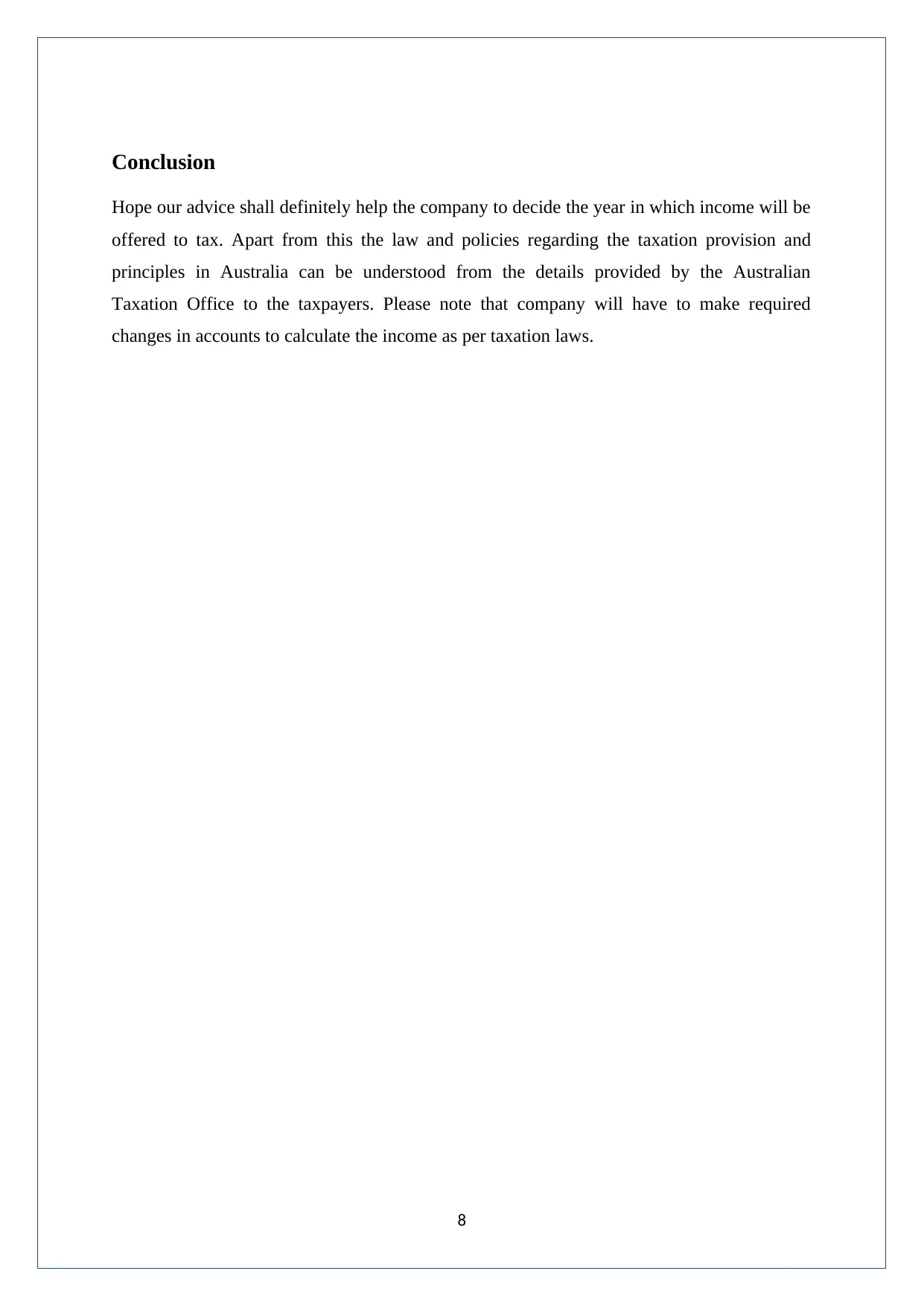
Conclusion
Hope our advice shall definitely help the company to decide the year in which income will be
offered to tax. Apart from this the law and policies regarding the taxation provision and
principles in Australia can be understood from the details provided by the Australian
Taxation Office to the taxpayers. Please note that company will have to make required
changes in accounts to calculate the income as per taxation laws.
8
Hope our advice shall definitely help the company to decide the year in which income will be
offered to tax. Apart from this the law and policies regarding the taxation provision and
principles in Australia can be understood from the details provided by the Australian
Taxation Office to the taxpayers. Please note that company will have to make required
changes in accounts to calculate the income as per taxation laws.
8
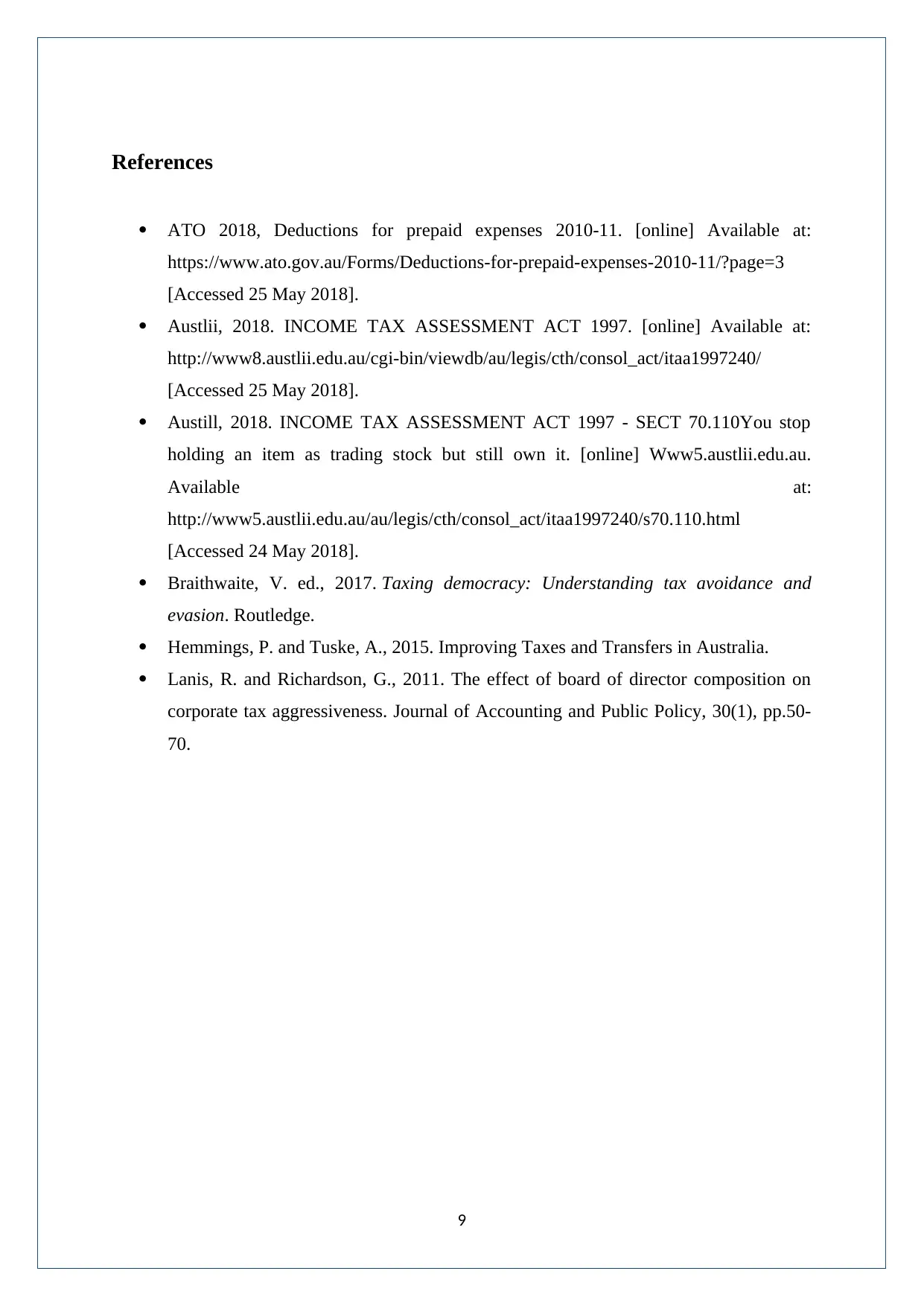
References
ATO 2018, Deductions for prepaid expenses 2010-11. [online] Available at:
https://www.ato.gov.au/Forms/Deductions-for-prepaid-expenses-2010-11/?page=3
[Accessed 25 May 2018].
Austlii, 2018. INCOME TAX ASSESSMENT ACT 1997. [online] Available at:
http://www8.austlii.edu.au/cgi-bin/viewdb/au/legis/cth/consol_act/itaa1997240/
[Accessed 25 May 2018].
Austill, 2018. INCOME TAX ASSESSMENT ACT 1997 - SECT 70.110You stop
holding an item as trading stock but still own it. [online] Www5.austlii.edu.au.
Available at:
http://www5.austlii.edu.au/au/legis/cth/consol_act/itaa1997240/s70.110.html
[Accessed 24 May 2018].
Braithwaite, V. ed., 2017. Taxing democracy: Understanding tax avoidance and
evasion. Routledge.
Hemmings, P. and Tuske, A., 2015. Improving Taxes and Transfers in Australia.
Lanis, R. and Richardson, G., 2011. The effect of board of director composition on
corporate tax aggressiveness. Journal of Accounting and Public Policy, 30(1), pp.50-
70.
9
ATO 2018, Deductions for prepaid expenses 2010-11. [online] Available at:
https://www.ato.gov.au/Forms/Deductions-for-prepaid-expenses-2010-11/?page=3
[Accessed 25 May 2018].
Austlii, 2018. INCOME TAX ASSESSMENT ACT 1997. [online] Available at:
http://www8.austlii.edu.au/cgi-bin/viewdb/au/legis/cth/consol_act/itaa1997240/
[Accessed 25 May 2018].
Austill, 2018. INCOME TAX ASSESSMENT ACT 1997 - SECT 70.110You stop
holding an item as trading stock but still own it. [online] Www5.austlii.edu.au.
Available at:
http://www5.austlii.edu.au/au/legis/cth/consol_act/itaa1997240/s70.110.html
[Accessed 24 May 2018].
Braithwaite, V. ed., 2017. Taxing democracy: Understanding tax avoidance and
evasion. Routledge.
Hemmings, P. and Tuske, A., 2015. Improving Taxes and Transfers in Australia.
Lanis, R. and Richardson, G., 2011. The effect of board of director composition on
corporate tax aggressiveness. Journal of Accounting and Public Policy, 30(1), pp.50-
70.
9
1 out of 9
Your All-in-One AI-Powered Toolkit for Academic Success.
+13062052269
info@desklib.com
Available 24*7 on WhatsApp / Email
![[object Object]](/_next/static/media/star-bottom.7253800d.svg)
Unlock your academic potential
© 2024 | Zucol Services PVT LTD | All rights reserved.





